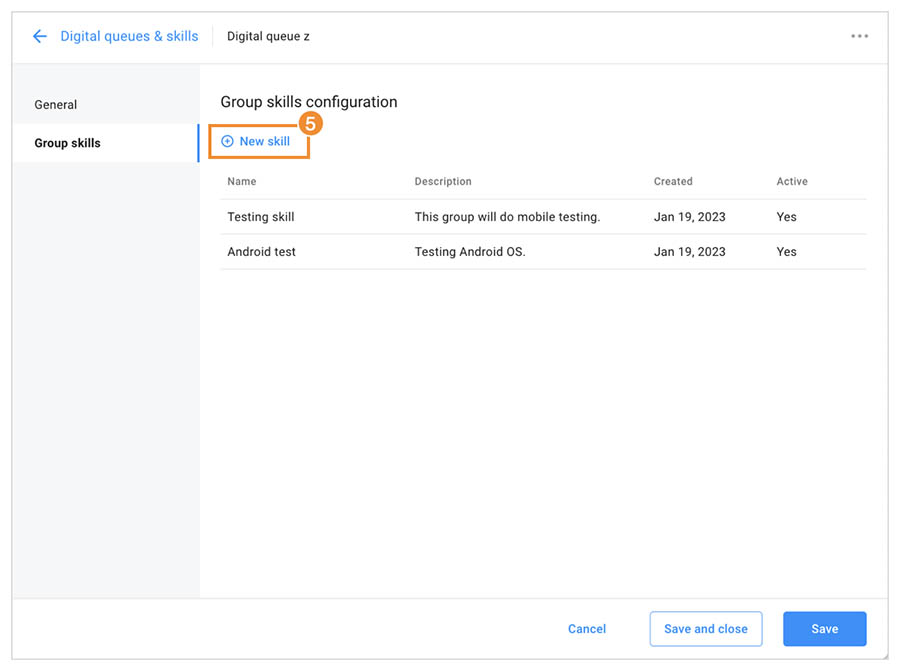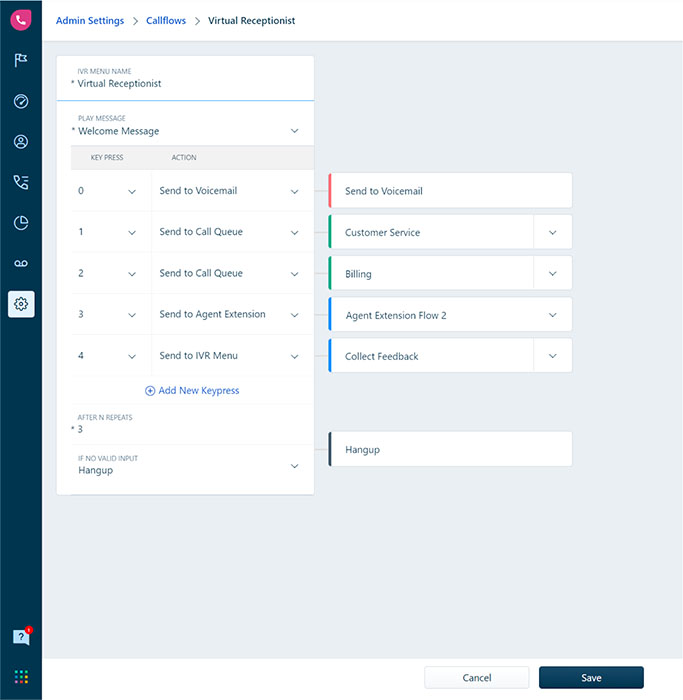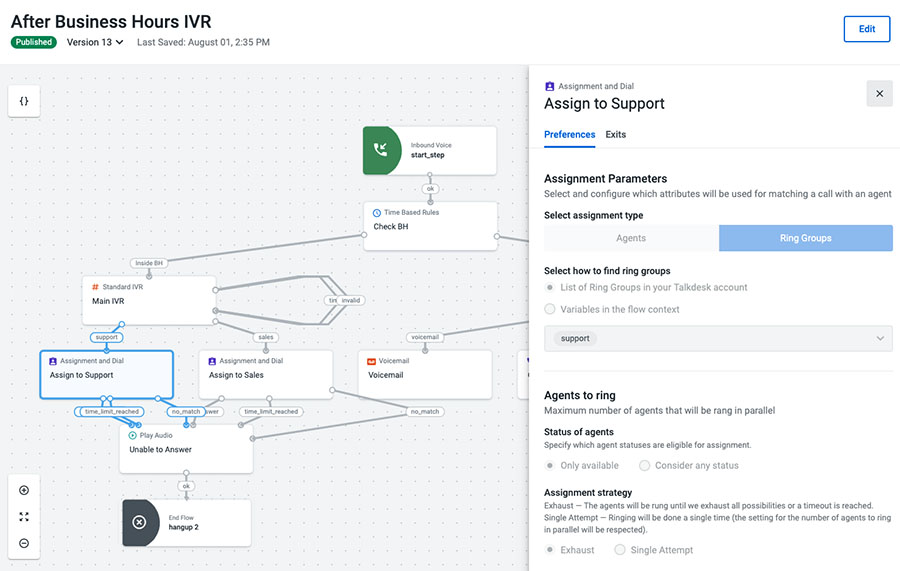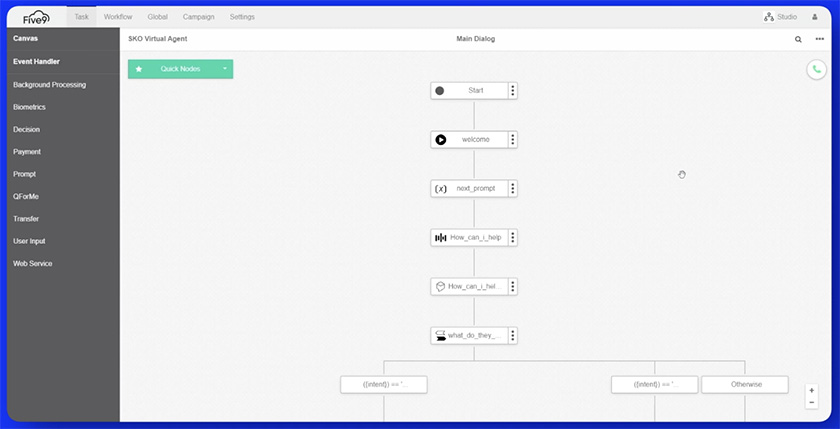Automatic call distribution (ACD) is a call routing method that distributes inbound calls to agents based on a specific set of instructions. This feature is common among cloud-based phone systems, allowing businesses to facilitate faster, more accurate customer service as inquiries and concerns are assigned to qualified agents. To understand exactly what is automatic call distribution, you must be familiar with its features, like call queues and interactive voice response (IVR).
How Automatic Call Distribution Works
Once a call comes in, your IVR navigates callers through an automated menu of options. The IVR collects information in relation to the customer’s concern or reason for calling. After the customer responds via voice or touch-tone keypad, the IVR places them in the queue. Using routing algorithms, ACD transfers customers accordingly—to an agent, voicemail, or prerecorded messages.
An ACD provides a structure for incoming calls directed to the most appropriate department or agent. This leads to a reduction in customer wait time, better call handling, and improved productivity and customer satisfaction. The rules are based on parameters such as the call location, membership tier, required skills, and urgency.
ACD systems help manage incoming calls in a call center, especially when traffic is too high, call center agents are unavailable, or calls are received outside business hours. It ensures optimal engagement as call centers connect you to your customers and potential clients.
On the agent’s end, ACD works with computer telephony integration (CTI), which connects your phone technology with the help desk or customer relationship management (CRM) software. When integrated, ACD matches caller IDs and numbers with customer records—arming your agents with relevant caller information for more meaningful, productive interactions.
The steps of an ACD process differ per system or organization, but the general routine is:
- Greet customers through the call center’s IVR system
- Prompt client’s selection through a menu of options
- Route calls based on predetermined routing algorithms to agents, voicemail, or prerecorded messages
Types of Automatic Call Distribution Methods
To better understand what is automatic call distribution and how it works, you must be familiar with the different types of ACD methods. This is key to selecting the most appropriate routing strategy for the communication demands in your call center. Below are some common automatic call distribution examples:
- Rotation: The system distributes calls equally among agents, and they take turns in answering.
- Simultaneous: The system sends a notification to all service representatives about an incoming call, and the first one to pick it up gets connected to the customer.
- Skills-based: The system assigns calls to agents based on their expertise in handling specific concerns.
- Fixed-order: The system directs phone calls to a list of service representatives arranged in a fixed order. The call goes to the first person on the list, and will only be reassigned when that service representative gets busy.
- Talk-time: The system sends calls to agents with the least talk time.
- Time-based: The system distributes calls to service representatives who are available on certain hours of the day or days of the week.
- Predictive behavioral: The system takes into account the caller’s personality, communication preference, and past contact experience when matching with the agent’s skills.
Benefits of ACD Systems
Automatic call distribution systems primarily facilitate improved customer service, as they allow businesses to respond quickly and accurately to queries and requests. Customers won’t be met with busy signals and unanswered phones, but instead be routed to the service representatives who are most equipped to assist.
Aside from improved customer service, ACD phone systems offer the following benefits:
ACD systems gather customer information and automatically match callers to agents knowledgeable enough to take on queries or who have received training for specific concerns. With mastery over issues, service representatives are more efficient at their jobs. Over time, this efficiency translates to confidence that bolsters individual performance.
Aside from boosting productivity, ACD systems promote collaboration among teams, as they feature call monitoring and conferencing tools that help representatives coordinate with one another easily. Some VoIP platforms even have instant messaging and video conferencing, allowing team members to consult each other for different concerns in real time.
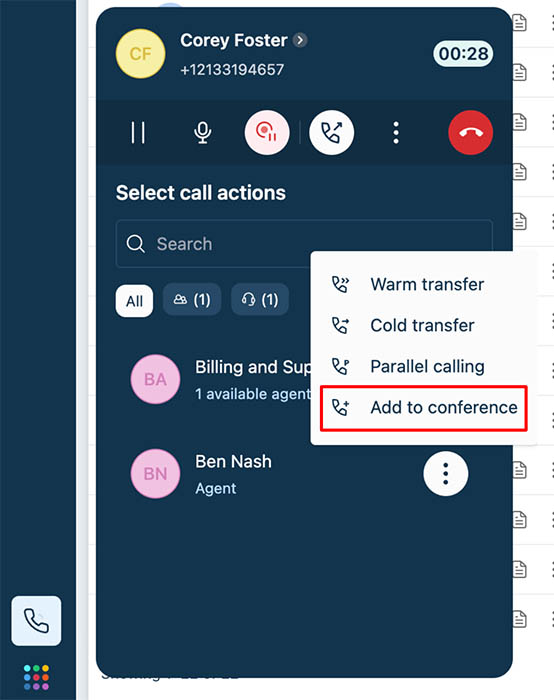
Start a conference call in the Freshdesk Contact Center. (Source: Freshworks)
Freshdesk Contact Center features conference call in its call control menu, along with other call actions, like call transfer and parallel calling. With this tool, new service representatives have the option to add a more experienced agent when addressing a complex customer query.
The phone system allows up to three conference call participants from anywhere in the world. It puts no limit on the number of conference calls, enabling team members to use it whenever they need the tool.
Without ACD systems, businesses hire more receptionists to manually transfer calls from one department to another. In case they send the call to the wrong department, you could be paying more for additional call minutes. ACD systems remove the need for more human receptionists and reduce the errors in distributing calls, providing plenty of money savings in business communications.
Since VoIP platforms are cloud-hosted, you’re able to do away with on-site equipment maintenance expenses. Some of these providers offer discounts for annual billing and volume users.
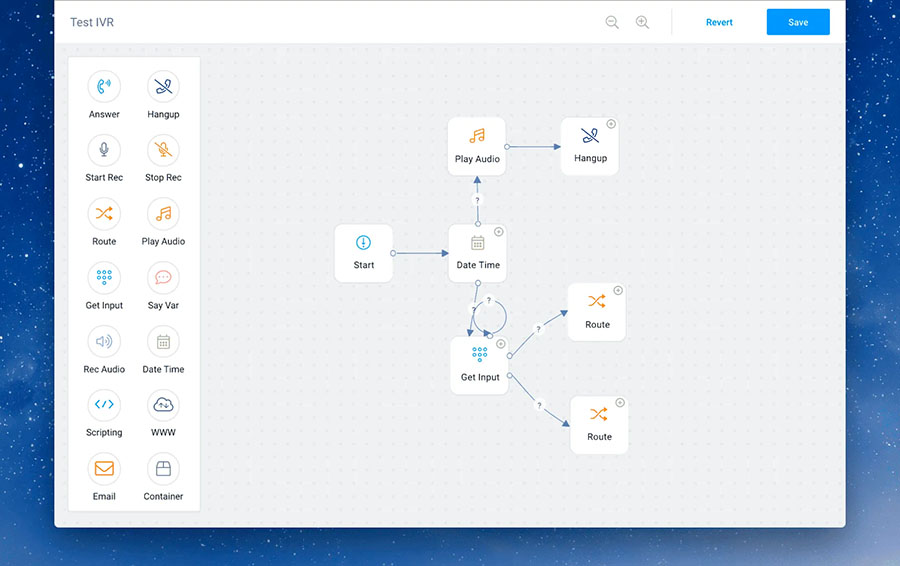
Create an IVR flow that efficiently distributes calls to appropriate agents. (Source: RingCentral)
By building a strategic IVR flow on RingCentral Contact Center, you won’t need more human agents to traffic incoming calls. Fortunately, its IVR tool is easy to use, as menu options are laid out in the design editor and can be quickly added to the call flow. As your business operations change, with more departments created or agents added to teams, configure the phone menu and keep it updated to maximize the financial benefits of ACD systems.
Through ACD systems, you’ll be able to establish a constant supporting presence for customers, which, over time, will build a reliable, trustworthy reputation. This is possible through different call routing configurations, like setting business hours and sending calls received after normal operating hours to employees’ voicemail boxes. Geographic routing distributes queries to call centers near the caller’s area code, which are likely in the same time zone as customers.
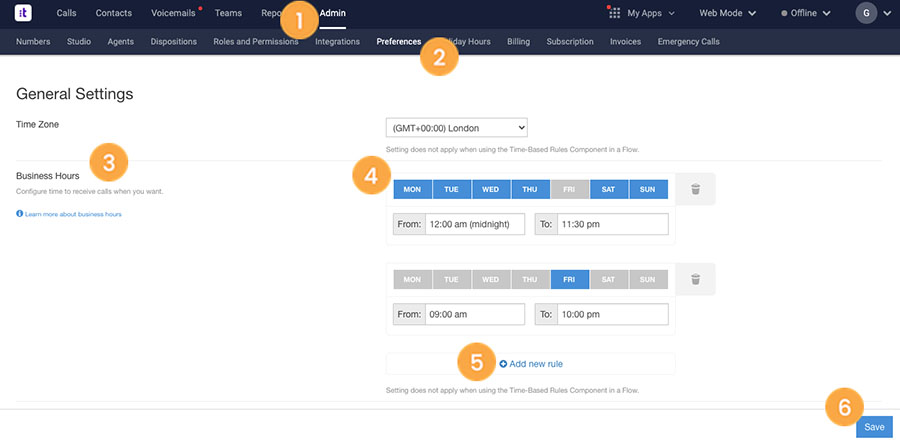
Set your business hours on Talkdesk (Source: Talkdesk)
With the contact center platform Talkdesk, users are able to configure when they want to receive calls. In the Business Hours settings, determine the times your call center is operational for certain days of the week. If you want callers to have access to the phone menu even outside business hours, enable the “After Hours IVR Enabled” option.
Top Features of ACD Systems
Now that you’re familiar with what is automatic call distribution, we can take a deep dive into ACD system capabilities. The following features facilitate more efficient call management, especially during peak times in a call center:
IVR
Automatic call distribution systems are equipped with basic IVR, which allows you to record greetings and menu announcements and direct callers based on their key presses. Some have advanced IVR, where the system responds to customers’ verbal menu options. Still, there are some with visual IVR, enabling callers to interact with a web application when getting assistance.
Call Queue
When inbound calls come through the phone system, they are arranged in a virtual line and put on hold. While in the queue and waiting for an available agent, customers hear prerecorded messages or music. Some business phone systems offer the option to update customers on how long the waiting time will take to help manage expectations. Others provide the callback feature to avoid long waiting times.
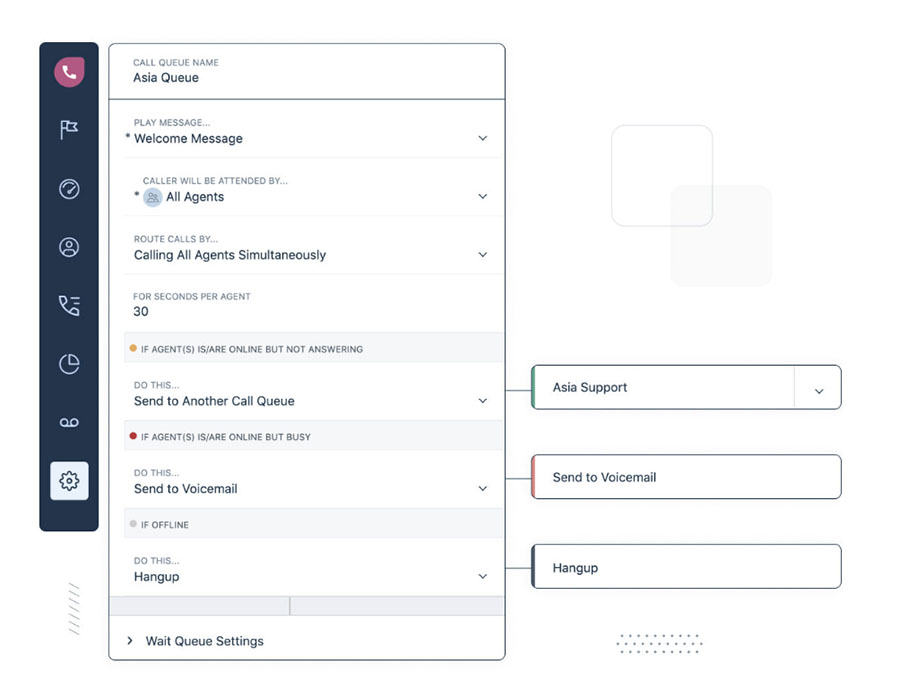
Configure call queue settings on the Freshdesk Contact Center. (Source: Freshworks)
Using Freshdesk Contact Center’s call queue management tool, you’ll be able to customize greetings, the assigned agents, and the call routing type. Similarly, you have the option to configure actions when agents are online but not answering or busy, for example, sending callers to the voicemail inbox. The phone system’s wait queue settings include the callback option.
Call Routing
Different business phone systems offer various call routing options. Most VoIP solutions have round-robin or sequential round-robin as the default, distributing phone calls to agents evenly. Meanwhile, skills-based routing allows admins to assign different skills, such as languages, information technology (IT) proficiency, and product knowledge, to each agent, group, or call queue.
Call Monitoring
To improve efficiency in call distribution, ACD systems come with call monitoring tools that let managers observe live conversations between customers and agents. By listening to active calls, team leaders are able to take note of points for improving communication with customers and speeding up the resolution of concerns. This helps in reducing talk time, which then minimizes the waiting time for other customers.
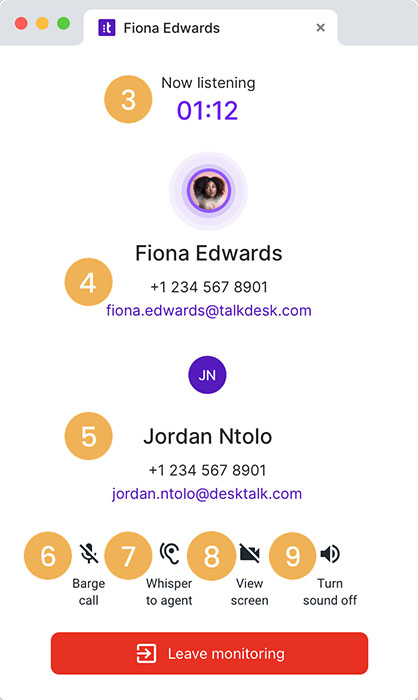
Observe live calls through Talkdesk’s call listening tools. (Source: Talkdesk)
Talkdesk enables team leaders to hear conversations between agents and customers in real time through its call listening tool. It features call whisper, letting managers offer advice to service representatives without the client knowing. In cases where you need to directly talk to the customer to immediately answer queries or de-escalate tense interactions, use the barge tool.
Third-party Integrations
Most ACD systems work with customer relationship management (CRM) tools, displaying customer profiles during a live call. With this, it’s easier for agents to respond to concerns as they see the personal details and account history of the client they’re talking to.
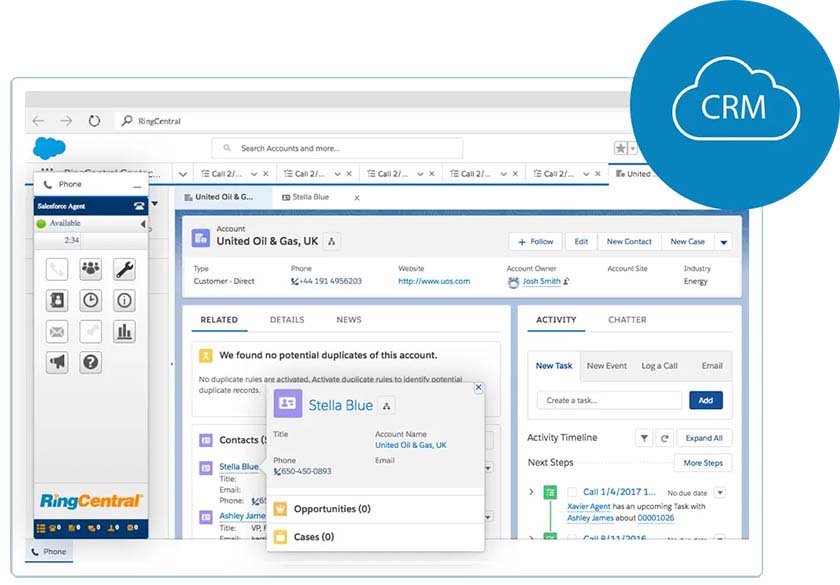
Connect RingCentral and Salesforce to access customer profiles more quickly. (Source: RingCentral)
RingCentral Contact Center integrates with Salesforce, enabling users to access the call control tools right within their CRM account. With customer profiles readily available, callers won’t have to repeat the same information over and over. Likewise, agents deliver a personalized service that enhances the overall customer experience.
Top Providers With ACD Systems
Cloud-based business phone systems are equipped with automatic call distribution, meaning this call routing system is a built-in feature in voice-over-internet-protocol (VoIP) phone solutions and call center platforms. If you want to manage calls more efficiently, consider these providers with robust ACD systems:
Frequently Asked Questions (FAQs)
The automatic call distribution (ACD) definition states that the system routes inbound calls to different agents according to predefined criteria. IVR is part of the ACD system, which announces prerecorded messages and responds to callers’ key presses, which represent menu choices.
PBX means private branch exchange, which refers to an internal telephone network allowing members of an organization to communicate with one another and outside through private lines. Meanwhile, ACD distributes incoming calls to service representatives within an organization based on preconfigured rules.
ACD is a feature of VoIP and contact center platforms. These software solutions provide monthly subscriptions, which range from $10 to $100 per user.
Bottom Line
Automatic call distribution software solutions improve customer support efforts by sending callers to the most qualified agents who provide fast and reliable service. Along with other call management features like IVR, call monitoring, and third-party integrations, they make handling inquiries and concerns less overwhelming for agents, especially when there’s high call volume during peak times.
Consider subscribing to a VoIP platform with a robust ACD system. Check out our top-recommended call center solutions.
